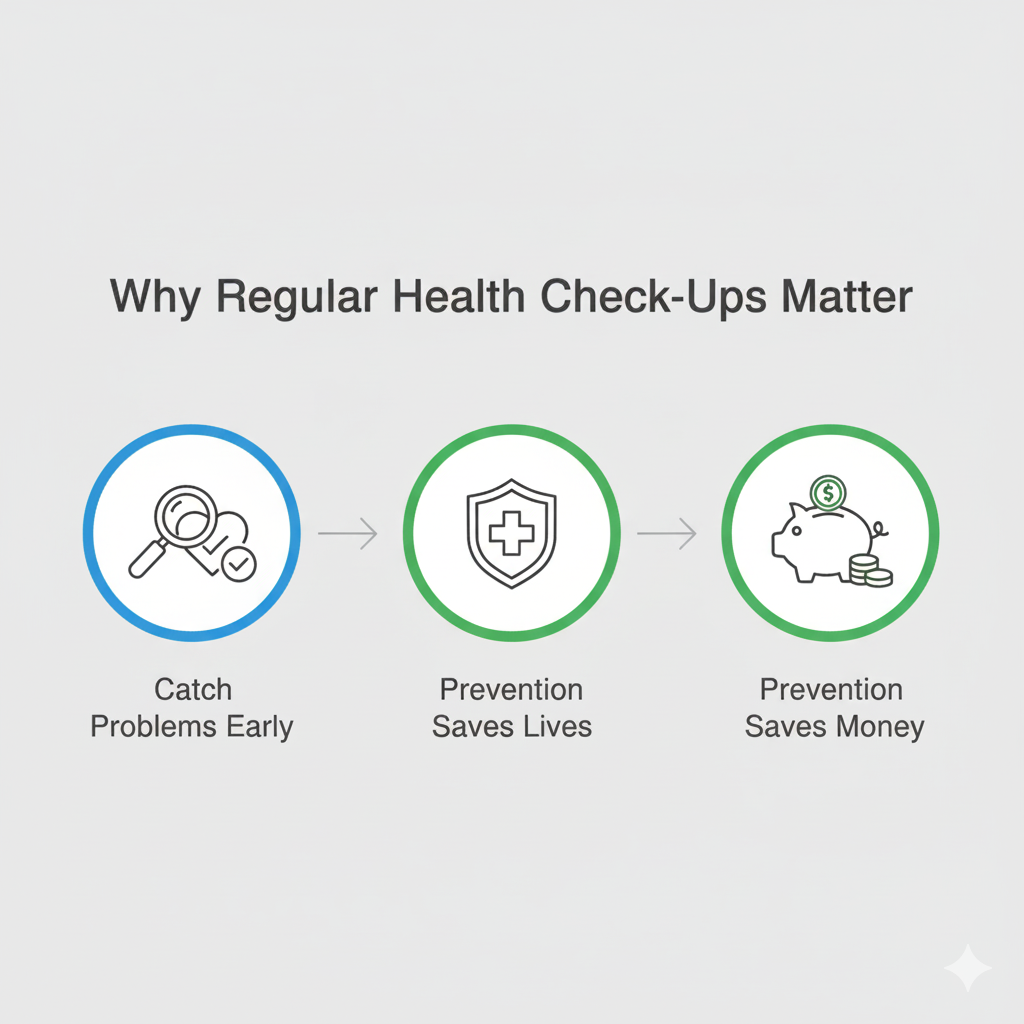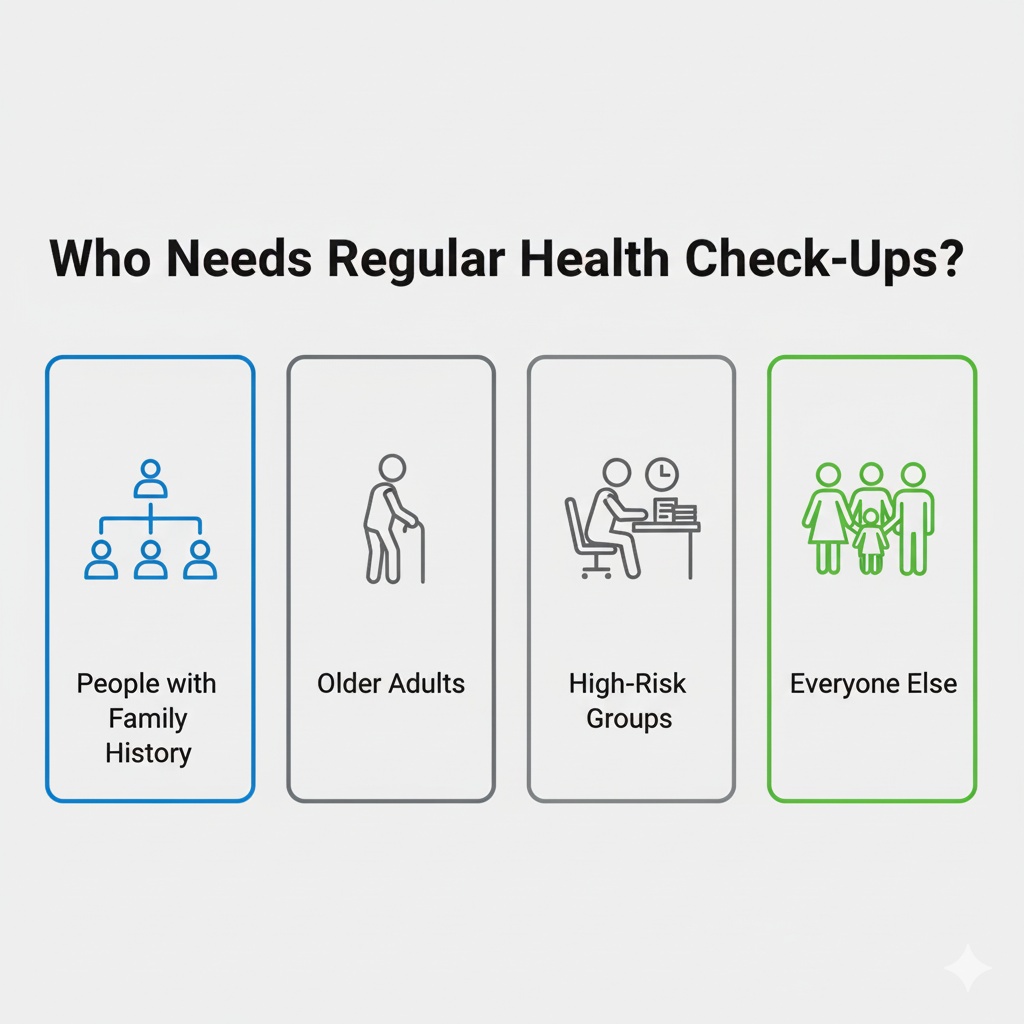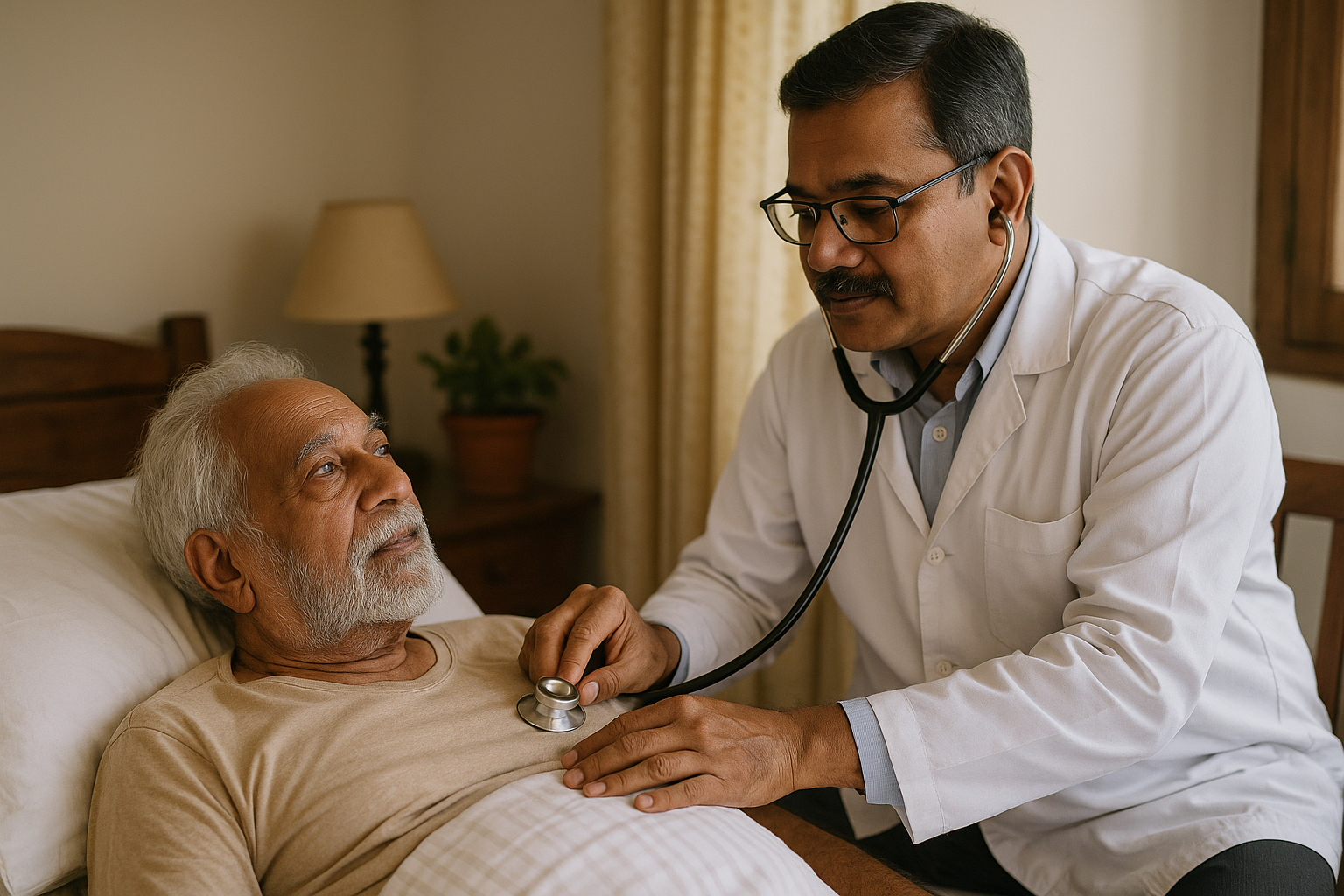Health check-ups keep us healthy. They help us catch problems early. Everyone should get regular health screenings. This simple step can make your life better and longer.
Why Regular Health Check-Ups Matter
Most people skip health check-ups until something goes wrong. This is a mistake. Regular screenings help you stay ahead of health problems. They show what's happening inside your body right now.
Think of check-ups like car maintenance. You wouldn't drive your car for years without an oil change. Your body needs the same care. Regular visits to your doctor can spot trouble before it gets serious.

Catching Problems Early
Health screenings find diseases when they're still small. This makes treatment easier and more successful. Many serious conditions start without any symptoms at all.
Blood pressure problems don't hurt. High cholesterol doesn't make you feel sick. Diabetes can grow quietly for years. Only regular testing can catch these silent threats.
Prevention Saves Money and Lives
Treating small problems costs less than fixing big ones. A simple blood test might find diabetes early. Managing it with diet and exercise is cheaper than dealing with complications later.
Early treatment works better too. Cancer caught early has much higher survival rates. Heart problems found early can often be managed without surgery.
Who Needs Regular Health Check-Ups?
People with Family Health Problems
Your genes matter. If your parents or siblings had diabetes, heart disease, or cancer, you're at higher risk. This doesn't mean you'll definitely get these diseases. It means you should watch for them more carefully.
Start screenings earlier if illness runs in your family. Get tested more often. Work with your doctor to make a plan that fits your specific risks.

Older Adults
Getting older brings more health risks. Your body changes. Systems that worked perfectly for decades might need help.
Regular check-ups help older adults stay independent. They catch problems like bone loss, hearing changes, and memory issues. Finding these early means better treatment options.
High-Risk Groups
Some people face extra health challenges. This includes those with:
- Stressful jobs that never seem to end
- Desk jobs with little movement
- Exposure to pollution or chemicals
- Poor sleep habits
- Unhealthy eating patterns
These lifestyle factors increase disease risk. Regular check-ups help manage these risks before they cause permanent damage.
Everyone Else
Even healthy people need check-ups. Life moves fast these days. Stress is everywhere. Regular screenings give you peace of mind. They also create a health baseline for your doctor to track changes over time.
%20(1).png)
Health Check-Ups by Age Group
Children and Teens
Growing bodies need regular monitoring. Kids need vaccines on schedule. They also need checks for proper development.
During these years, doctors watch for:
- Normal growth patterns
- Vision and hearing problems
- Learning or behavior issues
- Proper nutrition and exercise habits
Starting good health habits early lasts a lifetime.

Young Adults (20s and 30s)
Young adults often feel invincible. They think health problems happen to other people. This thinking can be dangerous.
Key screenings for this age include:
- Blood pressure checks every two years
- Cholesterol testing every four to six years
- Diabetes screening if overweight
- STD testing if sexually active
- Mental health check-ins
These years are perfect for building healthy habits that prevent problems later.
Middle-Aged Adults (40s and 50s)
This is when many health problems start showing up. The body begins changing in ways you might not notice.
Important screenings include:
- Annual blood pressure checks
- Cholesterol testing every few years
- Diabetes screening every three years
- Cancer screenings for breast, colon, and prostate
- Bone density tests for women after menopause
Don't ignore small changes in your body during these years.
Older Adults (60s and Beyond)
Health care becomes more important as you age. Your body needs more attention to stay strong.
Priority screenings include:
- Annual comprehensive exams
- Cancer screenings as recommended
- Bone density tests
- Vision and hearing checks
- Memory and thinking assessments
- Balance and fall risk evaluations
Regular care helps you stay active and independent longer.

Key Health Screenings You Need
Blood Pressure and Cholesterol
These are the basics of heart health. High blood pressure is called the "silent killer" because it has no symptoms. High cholesterol silently clogs your arteries.
Check blood pressure at least every two years if it's normal. Test it more often if it's high. Cholesterol testing should start around age 20 and repeat every four to six years.
Important Blood Tests
Blood tests tell a complete story about your health. They can spot problems you'd never feel.
Essential tests include:
- Complete Blood Count (CBC) - Shows anemia, infections, and blood disorders
- Blood sugar tests - Screen for diabetes before symptoms start
- Thyroid tests - Check hormone levels that control metabolism
- Liver function tests - Make sure this vital organ is working properly
These simple tests can save your life by catching problems early.
Cancer Screenings
Cancer screening saves lives. Many cancers can be cured if caught early enough.
Key screenings include:
- Mammograms for breast cancer starting at age 40-50
- Colonoscopy for colon cancer starting at age 45
- Pap smears for cervical cancer starting at age 21
- Skin checks for dangerous moles and spots
Don't delay these screenings. Early detection makes all the difference.
Diabetes Testing
Type 2 diabetes often develops without obvious signs. You might feel fine while your blood sugar slowly rises to dangerous levels.
Testing is especially important if you:
- Are overweight
- Have family members with diabetes
- Are over 45 years old
- Live a sedentary lifestyle
A simple blood test can reveal diabetes risk years before symptoms appear.
Benefits of Early Detection
How Early Detection Saves Lives
Finding diseases early dramatically improves outcomes. Treatment works better when problems are small. Your body can handle interventions more easily.
Consider these examples:
- Stage 1 breast cancer has a survival rate over 99%
- Early heart disease can be managed with lifestyle changes
- Pre-diabetes can be reversed with diet and exercise
The earlier you catch a problem, the more options you have for treatment.
Money Matters Too
Early detection saves money. Preventing a heart attack costs less than treating one. Managing diabetes early is cheaper than dealing with complications like kidney failure or blindness.
Regular check-ups might seem expensive. But they're much cheaper than emergency care or major surgery. Think of them as insurance for your health and your wallet.
Real Stories Make It Clear
Early detection changes lives every day. A routine mammogram finds a tiny tumor that surgery can easily remove. A blood test reveals diabetes before complications start. A colonoscopy finds and removes pre-cancerous polyps.
These aren't rare events. They happen thousands of times every day in doctor's offices everywhere.
Making Check-Ups Part of Your Life
Getting Ready for Your Visit
Preparation makes your appointment more valuable:
- Write down health concerns or symptoms
- List all medications and supplements you take
- Know your family health history
- Bring previous test results if you have them
The more information you share, the better your doctor can help you.
Dealing with Medical Anxiety
Many people avoid doctor visits because of fear or anxiety. This is normal but dangerous. Here are ways to cope:
- Learn what to expect during your visit
- Bring a trusted friend or family member
- Practice relaxation techniques before going
- Choose a doctor you feel comfortable with
Remember, your doctor wants to help you stay healthy. They're on your team.
Making It a Habit
The key to good health is making check-ups routine. Don't wait until you feel sick.
Tips for success:
- Schedule your next appointment before leaving the office
- Set phone reminders for annual screenings
- Link check-ups to your birthday or another date you'll remember
- Track your health numbers so you can see improvements
Regular care becomes easier when it's just part of what you do.
.png)
Making the Right Choice for Your Health
Health check-ups aren't just medical appointments. They're investments in your future. Every screening is a chance to catch problems while they're still manageable.
Don't wait for symptoms to appear. Many serious diseases start silently. By the time you feel sick, treatment might be harder and more expensive.
Your health is your most valuable asset. Protect it with regular check-ups and screenings. Work with healthcare providers who understand your needs and concerns.
The time you spend on prevention today gives you more healthy years tomorrow. Make that investment in yourself and your family.
FAQ
Do young adults really need regular check-ups?
Yes. Young adults should get check-ups even if they feel healthy. These visits establish baseline health data. They also catch problems that develop without symptoms. It's much easier to prevent diseases than treat them later.
How often should older adults see their doctor?
Seniors should have comprehensive check-ups at least once yearly. Some may need more frequent visits depending on existing conditions. Regular monitoring helps manage chronic diseases and prevents complications.
What if I feel fine - do I still need screenings?
Absolutely. Many serious conditions have no early symptoms. High blood pressure, diabetes, and early cancers often develop silently. Regular screenings catch these problems before you feel sick.
Which health screenings are most important?
The most critical screenings vary by age and risk factors. However, everyone should prioritize blood pressure checks, cholesterol testing, diabetes screening, and age-appropriate cancer screenings. Talk to your doctor about what's right for you.
How can I overcome fear of medical visits?
Medical anxiety is common and understandable. Start by choosing a healthcare provider you trust. Prepare questions in advance. Consider bringing support person with you. Remember that regular check-ups help you stay healthy and avoid more serious problems later.Regular health screenings are one of the best gifts you can give yourself. They provide peace of mind and the power to take control of your health before problems become serious.
.png)



.png)
.png)
.png)
.png)
.png)
.png)
.png)

.png)
.png)
.png)

.png)
.png)
.png)
.png)
.png)
.png)

.png)
.png)

.png)
.png)
.png)

.png)

.png)


.png)







